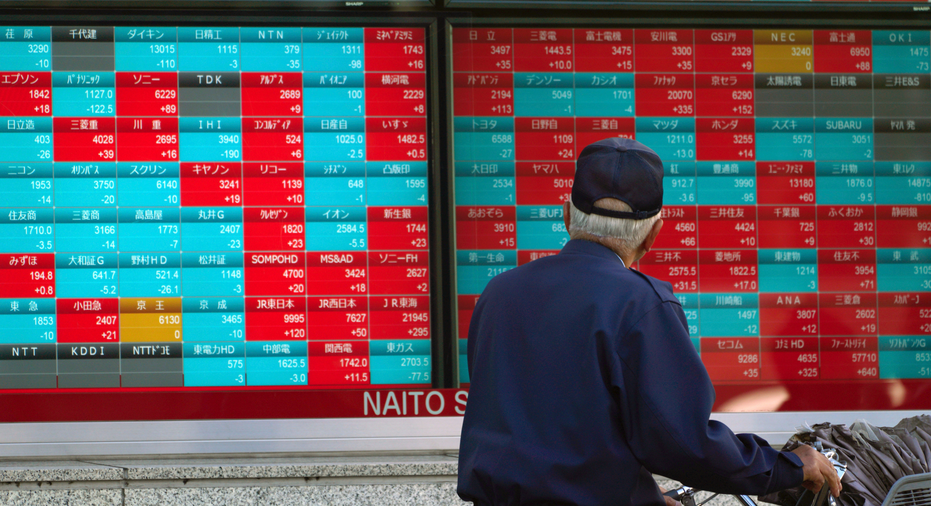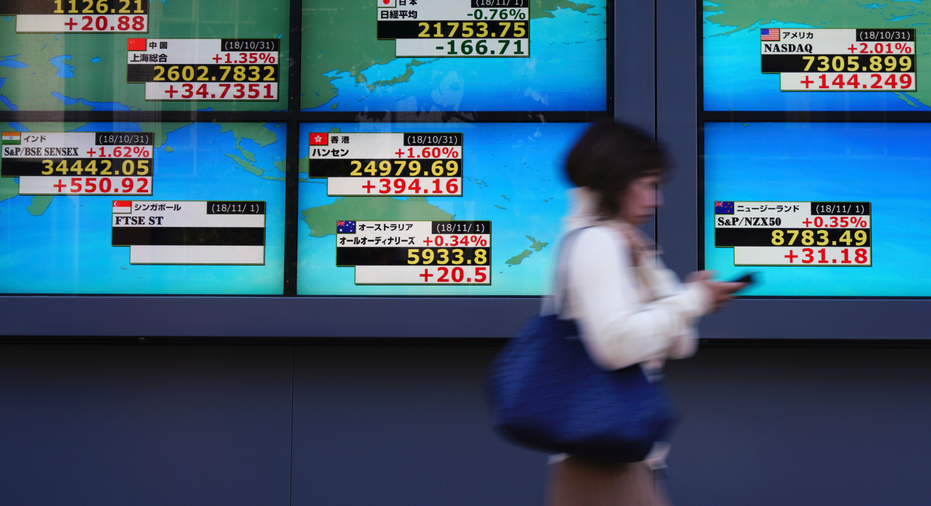World stocks gain on hopes for Brexit progress
A man looks at an electronic stock board showing Japan's Nikkei 225 index at a securities firm in Tokyo Thursday, Nov. 1, 2018. Stocks climbed for the second day in a row Wednesday at the end of a brutal month for the global market. Investors applauded strong quarterly results from companies including Facebook and General Motors, but U.S. stocks still finished with their worst monthly loss in seven years. (AP Photo/Eugene Hoshiko)
SINGAPORE – World markets were mostly higher Thursday following a report that British Prime Minister Theresa May has secured a deal with the European Union on financial services, as the country's exit from the bloc looms.
KEEPING SCORE: Germany's DAX rose 0.6 percent to 11,521 and France's CAC 40 was 0.1 percent higher at 5,098. Britain's FTSE 100 was 0.2 percent higher at 7,139. Wall Street was set for an optimistic open. Dow and S&P 500 futures both rose 0.4 percent.
ASIA'S DAY: Hong Kong's Hang Seng gained 1.8 percent to 25,416.00 while the Kospi in South Korea was 0.3 percent lower at 2,024.46. The Shanghai Composite index added 0.1 percent to 2,606.04. Australia's S&P-ASX 200 rose 0.2 percent to 5,840.80. Tokyo's Nikkei 225 index tumbled 1.1 percent to 21,687.65. Japanese telecommunications companies sank after mobile operator NTT DoCoMo caved to government pressure and said it would cut fees by as much as 40 percent next year. Its shares plunged 14.7 percent on Thursday. Stocks rose in Taiwan and throughout Southeast Asia.
BREXIT PROGRESS: Sentiment in Europe was boosted and the pound jumped on reports that Britain and the European Union had reached a deal to give U.K. financial services companies access to the bloc after Brexit. The article by The Times only cited anonymous sources, however, and other reports suggested a deal had not yet been finalized. The pound was up 1 percent at $1.2895, consolidating its rise after the Bank of England said it future rate increases depend on reaching a Brexit deal.
CHINESE STIMULUS: Manufacturing in China slowed in October, according to official data, triggering concerns over the effects of tariffs on businesses despite official assurances. In a statement on Wednesday, the State Council, China's Cabinet, said there was a need for "timely countermeasures" and that "some policy effects needs to be further released". The hint of more Chinese stimulus gave Asian markets an early lift. But worries that it would worsen tensions with Washington weighed on investors who were more risk adverse.
ANALYST'S TAKE: Fiscal stimulus by the Chinese government is a tricky affair as it would weaken its currency, Michael Every, senior Asia-Pacific strategist at RaboResearch, said in a commentary. "That is something they don't want, partly to prevent capital flight, and partly because Washington is watching like a hawk on that front," he added.
ENERGY: Oil prices continued to weaken on news that U.S. crude stockpiles increased for the sixth straight week. Benchmark U.S. crude lost 29 cents to $65.02 per barrel in electronic trading on the New York Mercantile Exchange. The contract dropped 87 cents to settle at $65.31 a barrel in New York. Brent crude, used to price international oils, shed 44 cents to $74.60 per barrel. In the previous session, it dropped 91 cents to $75.04 a barrel.
CURRENCIES: The dollar fell to 112.83 yen from 112.94 yen late Wednesday. The euro strengthened to $1.1401 from $1.1312.





















